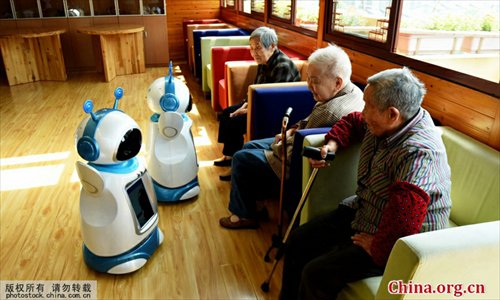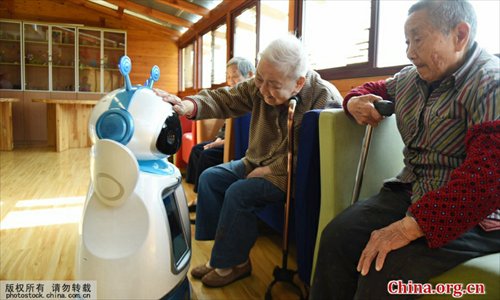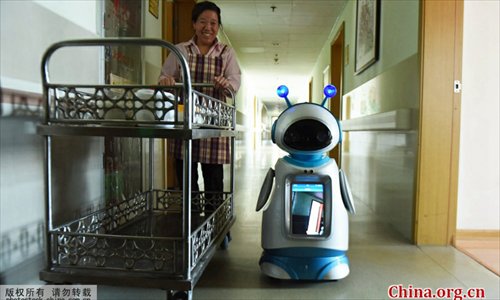Robots serve elderly in E China nursing home

A nursing home in Hangzhou, Zhejiang Province has introduced robots to help take care of seniors. The robots, less than a meter tall, are capable of working for up to 72 hours on a full charge. The robots have been well received by seniors at the home due to their adorable appearance and wide range of functions. Photo: China.org.cn

A nursing home in Hangzhou, Zhejiang Province has introduced robots to help take care of seniors. The robots, less than a meter tall, are capable of working for up to 72 hours on a full charge. The robots have been well received by seniors at the home due to their adorable appearance and wide range of functions. Photo: China.org.cn

A nursing home in Hangzhou, Zhejiang Province has introduced robots to help take care of seniors. The robots, less than a meter tall, are capable of working for up to 72 hours on a full charge. The robots have been well received by seniors at the home due to their adorable appearance and wide range of functions. Photo: China.org.cn
Elderly people forget things sometimes, but robots never do.
In the Hangzhou City social welfare center in east China's Zhejiang Province, five robots remind 1,300 seniors when to take their medicine.
"The average age of these seniors is over 84," Zhao Huming, vice director of the center, told Xinhua on Wednesday. "They often forget to take their medicine, or they take it twice."
The robots are programmed to "remember" medication schedules for seniors and nursing home workers. They send messages to remind them when it is time to take the pills.
"They make our work a lot easier," Zhao said.
The robots were developed by Woosiyuan Telecom Technology Co. Ltd. and are in trial operation. The "A-Tie" robots, whose name literally means "iron," are 0.8 meters tall and weigh 15 kilograms, similar to a two- or three-year-old human. They have round bodies and heads sprouting two antennae.
The robots are controlled by mobile phone app or touch screens, and they can do much more than remind patients to take their medicine. They can be used to make video calls, virtual consultations, or watch television.
Chen Wei, marketing manager with Woosiyuan, told Xinhua that the company spent three years developing the robots. "Following trial operations, we will make some improvements," he said.
They also plan to upgrade the robots to add new functions, such as performing inspections and holding conversations with people.
China had about 222 million people over 60 years old as of the end of last year, accounting for 16.1 percent of the country's total population, said Deputy Civil Affairs Minister Gao Xiaobing.
The country aims to sell more than 30 billion yuan (4.6 billion U.S. dollars) worth of service robots by 2020 amid surging demand in the health care, scientific research and domestic service sectors, according to a guideline posted on the website of the Ministry of Industry and Information Technology (MIIT).
"Robots could help save on human resources and improve service in senior care," said Zhao Huming. "Both elderly people and nursing home workers will benefit."